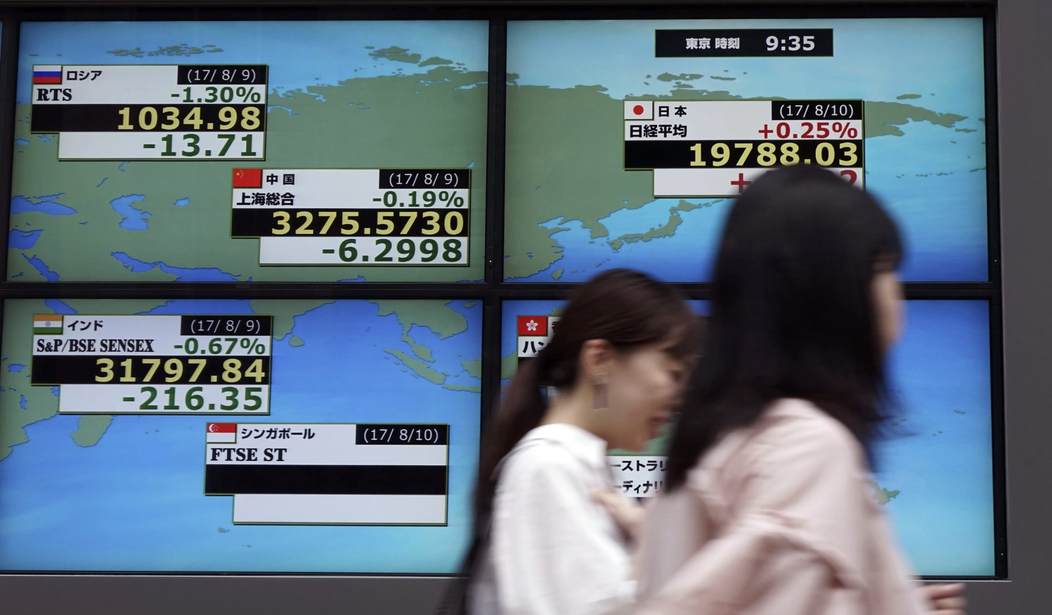No, the world isn’t heading into a nuclear war, at least not anytime soon.
That’s not PJ Media saying so. It’s not me, either.
It’s the stock market.
On Aug. 7 the S&P 500, an index of the 500 largest U.S. stocks, posted an all-time closing high of 2480.91. After that, tensions between Pyongyang and Washington ratcheted up, and stocks dropped sharply. At least they did temporarily.
If you believed the screeching TV pundits late last week, you might have thought the nuclear war was imminent followed quickly by a one-way ticket to Armageddon and the eventual annihilation of the human race.
The Aug. 10 market decline of almost 200 points on the Dow Jones Industrial Average seemed to confirm the dire view of the world and egged on the talk-show pundits. That’s understandable. Bleak warnings usually make for great TV ratings.
But the truth about the likelihood of imminent nuclear war is somewhat different, and it usually doesn’t get ratings.
“North Korea isn’t scaring people,” says Eddy Elfenbein, author of the Crossing Wall Street blog. “Rather, people who wanted to be scared (and exit their positions) have found an excuse in Pyongyang.”
In other words, some investors decided Aug. 10 was a reasonable time to ditch their stock holdings, and it had little to do with the potential start of another war on the Korean Peninsula.
Investors, such as Elfenbein, are telling the world the opposite of what talk-show guests are saying. We know this by looking at the level of the stock market, which in some ways is a crowd-sourced view of the future state of the world.
When investors buy stocks, they take a view on how company profits will perform in the future. If the stock traders bet correctly, then they make profits. If not, they lose. In short, they have an incentive to get their view of the future right. Not so much for some talk-show hosts.
Right now, the market says the world is looking just dandy. Before the opening today, the S&P 500 was right where it was in mid-July (2441), a time when few people thought the world was about to end and notably when dictator Kim Jong-un was also gleefully launching his missiles.
We can also look at another indicator to tell us that things aren’t so bad. It’s the so-called fear gauge or VIX. It measures the price for investors to buy insurance in case of a drop in the market. When investors are worried the VIX rises when they aren’t it falls.
Yes, it jumped May 10, but neither by much nor for long.
It jumped from less than 10 on Aug. 7 to 16 three days later. Early today, it was around 13.
“The VIX didn’t even reach levels […] experienced in the wake of the Brexit vote or around the November elections,” says Ernest Cecilia, chief investment officer at Bryn Mawr Trust Wealth Management.
To put that in context, Brexit saw a VIX high of 26, and the day after U.S. election it hit 22.5.
Those two levels should put things in perspective.
How could Britain leaving the European Union be worse than a nuclear war?
It couldn’t.
How could the U.S. voting for a new president with no experience in governing be worse than a nuclear war?
Again, it couldn’t.
All of which tells you that investors do not see an imminent nuclear war taking place.
In some ways, the stock market had one of its typical reactions on Aug. 10. Something new was happening or about to happen, so traders dumped their holdings. It happened after the Brexit vote, after the U.S. election. It also happened after the U.S. bombed Syria earlier this year.
Then, in each case, stocks recovered fairly quickly.
The real action on North Korea is happening in the background, where officials are dialing back President Trump’s remarks and looking for a way to solve the issue without war, writes Brad McMillan, chief investment officer at Commonwealth Financial Network, in a recent report.
Imminent nuclear war?
“We are probably not that close yet,” he writes. “The takeaway, for now, is that although risks are rising, they are not immediate. The market’s reaction is overdone for the moment.”









Join the conversation as a VIP Member